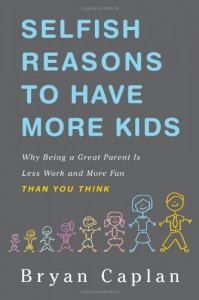Caleb J. Ross' booklikes
The official booklikes blog of author Caleb J. Ross.
Selfish Reasons to Have More Kids: Why Being a Great Parent is Less Work and More Fun Than You Think
 Unfortunately, the premise of this book relied on far too many stretched assumptions and too much false logic for me to finish it. For example, at one point when arguing against the idea of a child birthing as a selfish act (the reasoning being, for example, that a couple with a history of terminal cancer would be giving birth to a person to suffer the same) the author says that very few people regret having been born, so therefore a child would consider his life happy, even with cancer.The hole I see with this is that if a person were never born he would not even have been able to make the comparison between existence and non-existence. So, to have a person hypothetically compare his current life with one in which he was never even conscious simply doesn't work.The author does have some good statistical information (comparing today to the "Idyllic Fifties" for example) but, as I said above, supports those statistics with flimsy examples.
Unfortunately, the premise of this book relied on far too many stretched assumptions and too much false logic for me to finish it. For example, at one point when arguing against the idea of a child birthing as a selfish act (the reasoning being, for example, that a couple with a history of terminal cancer would be giving birth to a person to suffer the same) the author says that very few people regret having been born, so therefore a child would consider his life happy, even with cancer.The hole I see with this is that if a person were never born he would not even have been able to make the comparison between existence and non-existence. So, to have a person hypothetically compare his current life with one in which he was never even conscious simply doesn't work.The author does have some good statistical information (comparing today to the "Idyllic Fifties" for example) but, as I said above, supports those statistics with flimsy examples.




